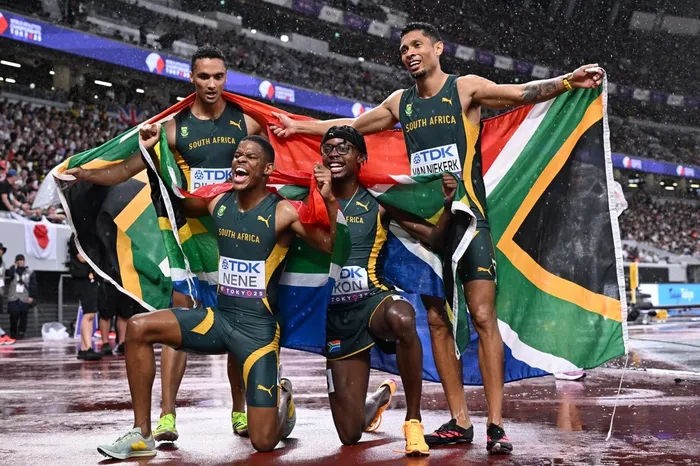South Africa won one medal at the Athletics World Championships, but is that good enough?

(From L) South Africa's athlete Lythe Pillay, South Africa's athlete Zakithi Nene, South Africa's athlete Udeme Okon and South Africa's athlete Wayde Van Niekerk poses after finishing third in the men's 4x400m relay final during the World Athletics Championships in Tokyo on September 21, 2025. Picture: Jewel Samad/AFP
Image: Jewel Samad/AFP
With South Africa winning one medal at the World Athletics Championships which ended on Sunday in Tokyo, Japan, the most obvious question is: is that good enough?
While the question is obvious, the answer is a lot more complicated.
The SA men’s 4x400m team ran the fastest time in qualifying for the final of their event, and then produced another stellar run to win a bronze.
In fact, they were credited with the same time of 2:57:83 as the USA and only lost out in a photo finish for the silver medal. Botswana was just slightly ahead of the USA and SA as they claimed the gold to make it a double podium finish for African nations in the event.
South Africa’s Relay Team Secures First World Championships Medal in Eight Years
The men’s relay team of Lythe Pillay, Udeme Okon, Wayde van Niekerk, and Zakithi Nene pulled off a top performance to secure the only medal for South Africa at the World Champs.
It was a significant achievement, though, as it was also the first medal at the World Championships in eight years for South Africa. Ironically, Van Niekerk was part of that successful SA team at the 2017 event, as he won a gold in the men’s 400m and a silver in the 200m.
That was, of course, when Van Niekerk was at the height of his powers before his career-altering knee injury.
In fact, South Africa won six medals back in 2017 - three golds, one silver, and two bronzes. That team included Caster Semenya, who won her final gold in the women’s 800m and also a bronze in the 1500m.
Now that it’s been so long since that stellar team turned out, there has been no real progress on the medal count at the event.
South Africa’s Relay Team Secures First World Championships Medal in Eight Years
Despite a strong showing by Team SA at the Paris Olympics last year, where South Africa won six medals but only four were from non-athletics events, the men’s 4x100m relay team stood out with a silver medal. However, they could not replicate that performance a year later at the Tokyo World Championships. One of the big possible reasons was that teen sensation Bayanda Walaza, who was part of the Paris relay team, was out injured for Tokyo.
Though South Africa still fielded a strong team with Shaun Maswanganyi, Sinesipho Dambile, Bradley Nkoana, and Akani Simbine, they were unable to make the final. This was actually the same team from Paris, with only Walaza missing.
Jo-Ane du Plessis Shines in Women’s Javelin Final Despite Fourth Place Finish
Then it was the turn of Jo-Ane du Plessis, who won silver in Paris, to compete in the women’s javelin final.
Though the 27-year-old was in a podium spot for almost the entire final, she was edged into fourth place at the end. It was still an improvement from her 10th place in the last edition, in what was just her third appearance at the World Championships.
Another potential medal hope, Prudence Sekgodiso, crashed out during the women’s 800m heats as she pulled up with a hamstring injury. Currently ranked fifth in the world. It came as a crushing blow for the athlete, who many have tipped to succeed Semenya’s throne for South Africa.
At 23, though, Sekgodiso should have many more opportunities to show her potential.
There were a number of other disappointments from a South African perspective at the World Championships, like Nene failing to produce his best time of the event in his 400m men’s final as he finished fifth.
Ultimately, though, there were 11 SA representatives in their respective finals, and that’s not exactly a bad return. For now, perhaps that should be a better gauge of South Africa’s progress on the world stage, and not medals alone.
* The views expressed are not necessarily the views of IOL or Independent Media.
** JOIN THE CONVERSATION: Send us an email with your comments, thoughts or responses to [email protected]. Letters should be a maximum of 500 words, and may be edited for length. Anonymous correspondence will not be published. Submissions should include a contact number and physical address (not for publication).
Related Topics: